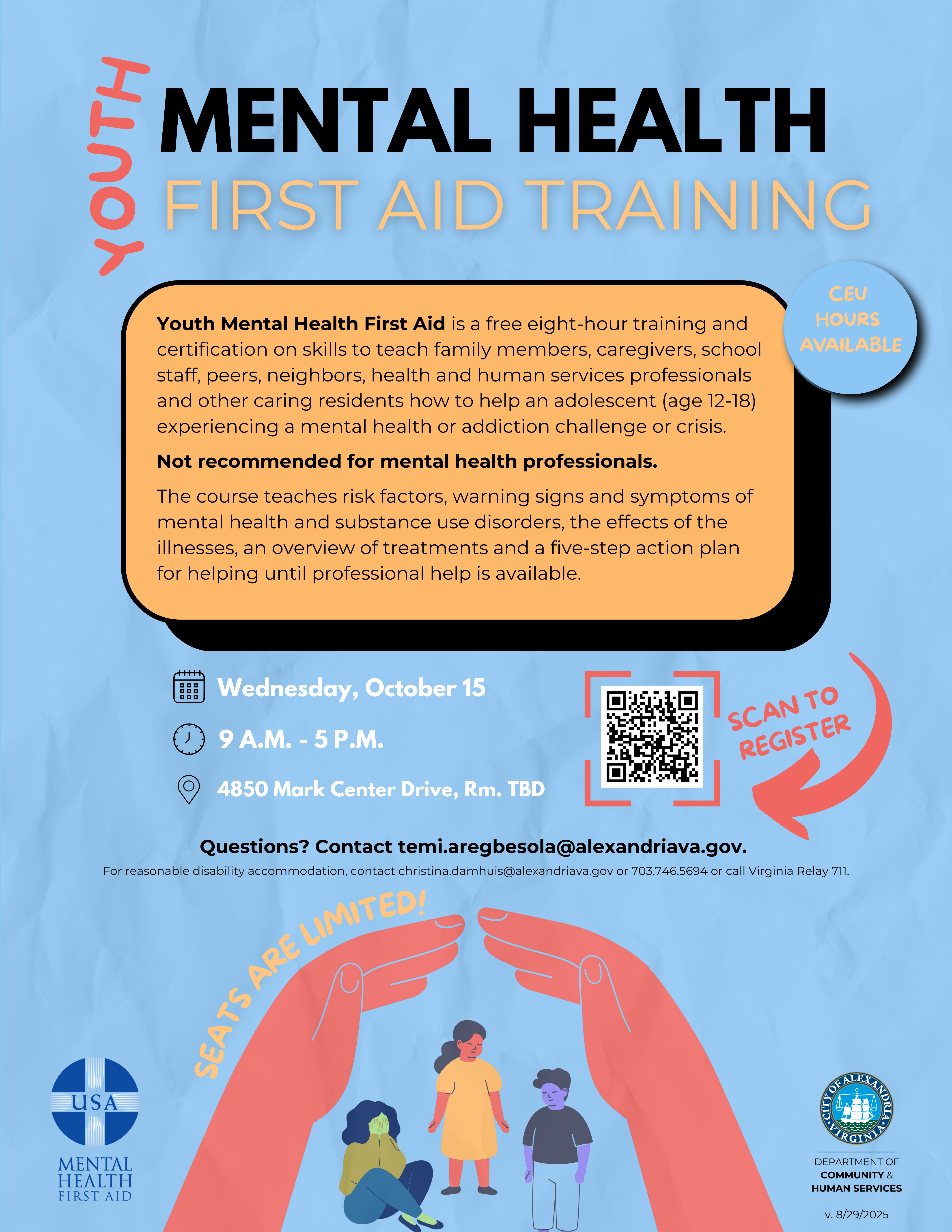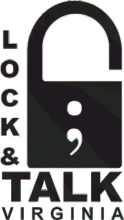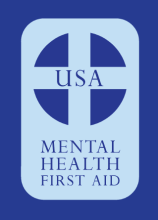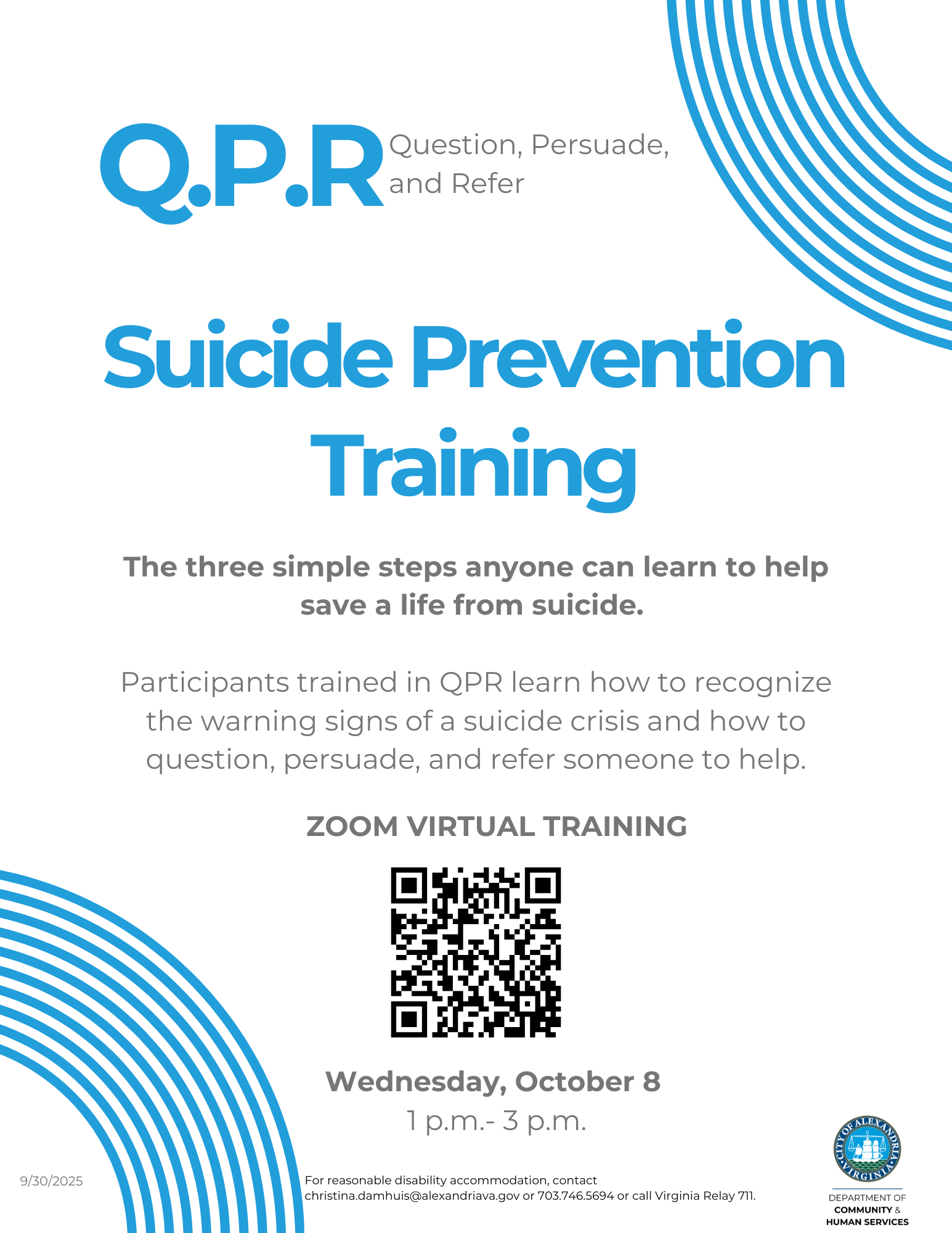
Suicide Risks and Prevention Resources
Get Help: Talk to Someone Now

- National Suicide Prevention Lifeline- Call 988 (option 1 for military/veterans) or text any message to 988. For Deaf and Hard of Hearing, use your preferred relay service or dial 711, or, chat with someone 24/7 online through Lifeline Chat
- Emergency Services, Alexandria Department of Community and Human Services: 703.746.3401
- PRS Crisis Link: Text “CONNECT” to 85511
- National Suicide Prevention Lifeline Veterans Crisis Line- Call 1.800.273.8255, Press 1, or text 838255, or chat confidentiality with someone online 24/7 through Crisis Chat.
- Red Nacional del Suicidio: 1.888.628.9454
- The Trevor Project, LGBT Youth: 1.866.488.7386 or TrevorText, a confidential and secure resource that provides live help for LGBTQ youth with a trained specialist, over text messages: Text START to 678-678. Chat with someone online 24/7 through Trevor Chat.
Lock & Talk Virginia: Lock Meds. Lock Guns. Talk Safety.

DCHS offers free locking medication boxes and firearm trigger or cable locks as part of Lock and Talk Northern Virginia. Studies show that when firearms are accessible, individuals are three times more likely to die by suicide, and that most people who complete suicide use firearms (61%) or poisons/medications (19%).
Limiting access to lethal means, talking with those who may want to end their lives and quickly accessing help are essential to prevention and also prevent accidents. The free firearm locks and medication lock boxes include information on safe handling and messaging, and tips to secure firearms and medications. Learn more about safe medication disposal. The best strategy for protecting a person at risk is to remove lethal means from the home until a mental health crisis is resolved.
Obtain firearm locks and medication lock boxes at the following locations and times, except holidays:
- Clerk of the Circuit Court’s Office, 520 King Street, Room 307, 8 a.m. to 4 p.m., Monday through Friday. Gun locks only. 703.746.4044
- Alexandria Health Department- 4850 Mark Center, Monday through Friday 9 a.m. – 4 p.m. 703.746.3382
- Del Pepper Community Resource Center DCHS, 4850 Mark Center, contact noraine.buttar@alexandriava.gov to schedule a pick up.
- Alexandria Sheriff’s Office, 2003 Mill Road, Visitor Center, 24 hours a day. 703.746.4114.
- Select Alexandria Libraries: Charles E. Beatley, Jr. Central Library, Kate Waller Barrett Branch Library, Ellen Coolidge Burke Branch Library and James M. Duncan, Jr. Branch Library. Call branch to verify hours or visit alexlibraryva.org/locations. Gun locks only.
Youth Mental Health First Aid Training
According to the National Alliance on Mental Illness, one in six youth aged 6-17 experience a mental health disorder each year in the United States. DCHS offers a training course designed to help laypersons and paraprofessionals learn skills to support adolescents who are experiencing a mental health or addiction challenge or crisis.
Youth Mental Health First Aid is open to parents, family members, caregivers, teachers, school staff, peers, neighbors, health and human services workers and other caring residents. The free course teaches risk factors, warning signs and symptoms of mental health and substance use disorders, the effects of the illnesses, an overview of treatments and a five-step action plan for helping someone with symptoms.
The next session will be held Wednesday, October 15 from 9 a.m. to 5 p.m. at 4850 Mark Center Drive. Lunch is included. Pre-work is required.
For future training dates, contact Dr. Temi O. Aregbesola MPH, Ph.D at Temi.aregbesola@alexandriava.gov.

Mental Health First Aid

DCHS offers Mental Health First Aid (MHFA) for laypersons and paraprofessionals. MHFA is an eight-hour training and certification on skills to help persons who are developing a mental health problem or experiencing a mental health crisis. The training demonstrates the initial help given to a person showing signs of mental illness or a mental health crisis. More information about the course is available. Re-certification is available online, or by taking the full course again.
Register for upcoming training sessions
For upcoming training dates, contact debra.evans@alexandriava.gov.
* Pre-work must be completed one week prior to the training date
Q.P.R. Suicide Prevention Training
QPR stands for Question, Persuade, and Refer — the three steps anyone can learn to help save a life from suicide.
Just as people trained in CPR and the Heimlich Maneuver help save thousands of lives each year, people trained in QPR learn how to recognize the warning signs of a suicide crisis and question, persuade, and refer someone to help.
The next VIRTUAL QPR- Suicide Prevention Training is on Wednesday, October 8 at 1 p.m. Register now!
This training is free and open to the public. To find out about upcoming training or to schedule a training, contact Dr. Temi O. Aregbesola at Temi.aregbesola@alexandriava.gov

Who is at Risk for Suicide?
There is no single cause of suicide. Several factors can increase a person’s risk for attempting or dying by suicide. However, having these risk factors does not always mean that suicide will occur. Risk factors for suicide include:
- Previous suicide attempt(s)
- History of depression or other mental illness
- Alcohol or drug abuse
- Family history of suicide or violence
- Physical illness
- Feeling alone
Learn more about suicide risk and protective factors from the Centers for Disease Control.
Know The Signs - Warning Signs of Suicidal Behaviors
Everyone can play a role in preventing suicide by being aware of the warning signs of suicidal behaviors:
- Talking about wanting to die, feeling hopeless, trapped, in unbearable pain, or being a burden to others
- Looking for a way to kill oneself
- Increasing the use of alcohol or drugs
- Acting anxious, agitated, or reckless
- Sleeping too little or too much
- Withdrawing or feeling isolated
- Showing rage or talking about seeking revenge
- Displaying extreme mood swings
Helping Your Loved One Who is Suicidal: A Guide for Family and Friends
This guide from SAMHSA will help families who have a loved one who is suicidal or has made a suicide attempt. It will provide information on understanding suicide, warning signs and action steps to take, and how to prevent future attempts and keep your loved one safe.
What You Can Do - Helping Someone in Crisis
If you believe someone is at risk of suicide:
- Ask them if they are thinking about killing themselves (This will not put the idea into their heads, or make it more likely that they will attempt suicide.)
- Call the U.S. National Suicide Prevention Lifeline at 988.
- Take the person to an emergency room or seek help from a medical or mental health professional
- Remove any objects that could be used in a suicide attempt
- If possible, do not leave the person alone
Other Ways to Help Prevent Suicide
- Get involved with the Suicide Prevention Alliance of Northern Virginia.
- Join Alexandria’s Trauma Informed Community Network (TICN), Resilience Alexandria: Inform. Support. Elevate.
This is Recovery
“This is Recovery” is a 14 minute video featuring men and women across Northern Virginia who share their stories of recovery to help others who are dealing with similar challenges. They enable and inspire all of us to live in hope. This video was funded by the Virginia Department of Behavioral Health and Development Services and produced by members of the Virginia Recovery Initiative Region 2. Learn more about the video and City of Alexandria programs and services related to recovery.
Mental Health Resources
Additional Information and Help
- American Foundation for Suicide Prevention
- National Alliance on Mental Illness
- National Suicide Prevention Lifeline
- Speaking of Suicide, a comprehensive resource for at-risk individuals and their families
- Know the Signs: Teens and Older Adults
- 5 Action Steps for Helping Someone in Emotional Pain (National Institute of Mental Health)
- Saving Young Lives: The Trevor Project for LGBTQ Youth
- Older Adults and Depression (National Institute of Mental Health)
- ACE: Suicide Prevention for Veterans, Their Families and Friends (U.S. Department of Veteran Affairs)
- Suicide Prevention: Tips & Resources for Teens & Parents (English & Spanish) (Arlington Public Schools)
- Suicide Prevention Alliance of Northern Virginia (SPAN): A regional coalition of the Alexandria, Arlington, Fairfax-Falls Church, Loudoun, and Prince William Community Services Boards (CSBs) and other groups in Northern Virginia, all working together to raise awareness and share resources to prevent suicide